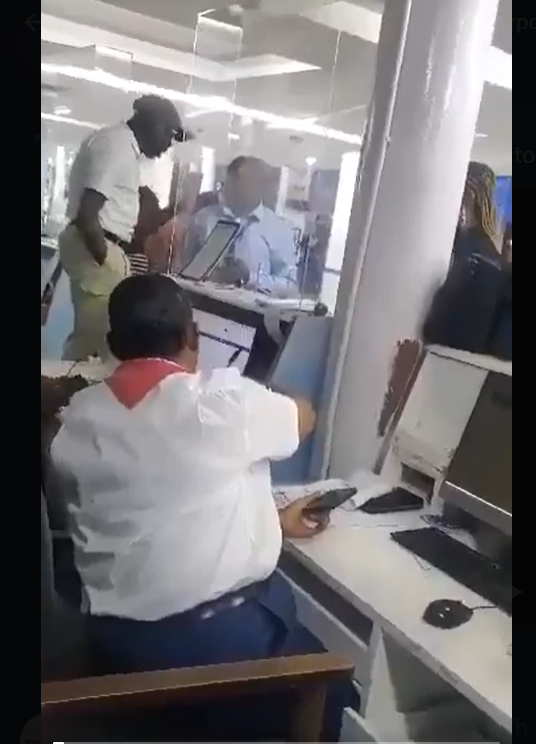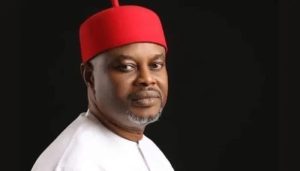Lagos, Nigeria – 11 June 2025 – Senator Adams Oshiomhole, a former governor of Edo State and current senator representing Edo North, caused a significant disturbance at Murtala Muhammed Airport (MMA) in Lagos yesterday after missing an Air Peace flight to Abuja. The incident, which saw the senator allegedly block the terminal entrance and engage in a heated altercation with airport staff, has reignited debates about the conduct of Nigerian politicians, the legacy of mismanagement at the defunct Nigeria Airways, and the broader implications for airport security and accountability.
According to multiple reports, Senator Oshiomhole arrived at the General Aviation Terminal (GAT) at 6:20 a.m. for a 6:30 a.m. Air Peace flight. Informed that the flight had departed, the senator reportedly refused to leave the check-in area, barricading the Zulu Terminal entrance and preventing other passengers from accessing the terminal. Video footage circulating online shows a figure resembling Oshiomhole obstructing the gate, with airport staff pleading for cooperation. Air Peace, in a statement titled “Unruly Conduct by Prominent Politician at Lagos Airport,” condemned the senator’s actions, alleging he assaulted staff and disrupted operations. The airline activated a contingency plan to board affected passengers through an alternate terminal to minimise further delays.
This incident has raised serious concerns about airport security. Experts note that such disruptions could create vulnerabilities, potentially exploitable by malicious actors, including terrorists, to cause chaos. Nigeria’s aviation sector, already grappling with logistical and safety challenges, cannot afford lapses that compromise passenger safety. The Federal Airports Authority of Nigeria (FAAN) has yet to issue an official statement, leaving questions about the enforcement of security protocols unanswered.
Oshiomhole’s actions evoke memories of the systemic issues that plagued Nigeria Airways, the country’s defunct national carrier, which collapsed in 2003. During its operation, the airline was notorious for mismanagement, driven in part by political patronage. Politicians and their associates frequently secured seats without payment, demanded preferential treatment, and pressured staff to bend operational rules. This culture of entitlement eroded the airline’s financial stability, contributing to its eventual demise. The parallels with Oshiomhole’s alleged expectation of special treatment are striking, highlighting a persistent sense of privilege among Nigeria’s political elite.
Aviation analyst Dr. Chidi Amuta commented, “The collapse of Nigeria Airways was not just about poor management but a culture where powerful figures treated public resources as personal fiefdoms. Oshiomhole’s behaviour suggests this mindset persists, undermining the professionalism of airlines like Air Peace.”
Under Nigerian law, specifically the Civil Aviation Act 2022, disruptive behaviour at airports that endangers safety or operations is a punishable offence, potentially leading to fines, imprisonment, or placement on a no-fly list. Legal experts argue that Oshiomhole’s actions, including obstructing a terminal and allegedly assaulting staff, constitute a clear violation. Yet, as of now, no arrest has been made, and the senator has not been detained or formally charged. This inaction has fuelled public frustration, with many questioning whether influential figures are above the law.
Internationally, such behaviour could have severe consequences. The United States, known for its stringent airport security policies, maintains a zero-tolerance stance on disruptions that threaten aviation safety. The U.S. Transportation Security Administration (TSA) and Federal Aviation Administration (FAA) have previously imposed bans on individuals involved in similar incidents. Given Nigeria’s history of aviation security scrutiny, including past U.S. concerns about Nigerian airports, Oshiomhole’s actions could prompt calls for sanctions, such as a travel ban to the U.S. or other Western nations. However, no such measures have been announced, and it remains unclear whether foreign governments are monitoring the situation.
The Nigerian presidency and the Minister of Aviation and Aerospace Development, Festus Keyamo, have remained conspicuously silent on the incident. This lack of response has drawn criticism, with many Nigerians questioning the government’s commitment to holding public officials accountable. Social media platforms, particularly X, have been abuzz with calls for swift action, with some users suggesting that the government’s inaction reflects a broader tolerance for elite impunity. One X user remarked, “If a common citizen caused this chaos, they’d be in cuffs by now. Why the double standard?”
In a press conference in Abuja, Senator Oshiomhole denied disrupting airport operations, claiming instead that he was exposing systemic extortion and poor customer service by Air Peace. He alleged that he arrived at the airport on time for a different flight on Tuesday evening, only to face unfair treatment. Oshiomhole further accused the Nigerian Civil Aviation Authority (NCAA) of lax oversight, framing his actions as a stand for passengers’ rights. However, he has neither issued a public apology nor surrendered to security agencies for investigation, a move that critics argue undermines his credibility.
Public reactions to Oshiomhole’s defence have been mixed. While some supporters view his stance as a challenge to inefficiencies in the aviation sector, others see it as an attempt to deflect responsibility. “Oshiomhole’s claims don’t justify barricading a terminal or assaulting staff,” said Lagos-based lawyer Aisha Bello. “He should face the consequences like anyone else.”
The incident has sparked a broader debate about accountability for Nigeria’s political class. Many Nigerians are calling for Oshiomhole to be sanctioned, potentially through a no-fly list or legal prosecution, to deter similar behaviour. There are also demands for the NCAA and FAAN to strengthen oversight and ensure that security protocols are enforced uniformly, regardless of status. Internationally, aviation stakeholders are watching closely, as Nigeria’s response could impact its standing in global aviation circles.
As the controversy unfolds, the silence from key stakeholders and Oshiomhole’s refusal to apologise continue to fuel public outrage. The incident serves as a stark reminder of the challenges facing Nigeria’s aviation sector and the urgent need for reforms to address both operational inefficiencies and the culture of entitlement that persists among the elite.
Subscribe to our newsletter!






